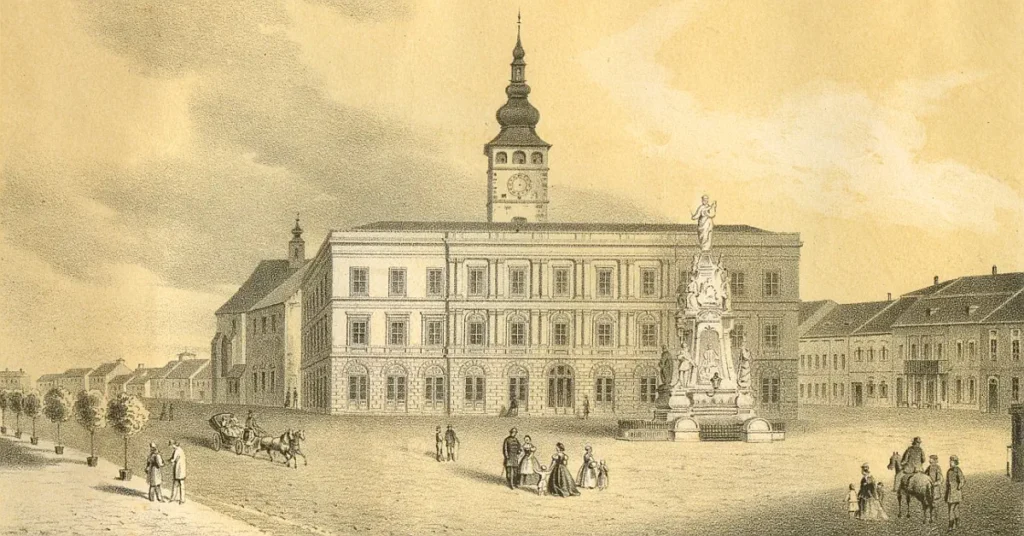
The Institute of Philosophy was established in 1946 as a part of the then Slovak Academy of Sciences and Arts. In 1953, it became part of the newly founded Slovak Academy of Sciences. In 1975, it was merged with the Institute of Sociology under the name Institute of Philosophy and Sociology of the Slovak Academy of Sciences. In 1990, when both institutes became independent again, it reverted to its original name.
In the first years of the institute’s existence, its staff focused primarily on research into the history of Slovak philosophy and the philosophy and methodology of science.
Research into the history of Slovak philosophy was initially focused on the main institutions of higher education operating since the 17th century in the territory of present-day Slovakia – the Jesuit University in Trnava (founded in 1635) and the Evangelical College in Prešov (founded in 1667). Later, the emphasis shifted to research into the philosophical aspects of the Slovak national emancipation movement in the 18th and especially in the 19th centuries. Based on a thorough analysis of the source material, an innovative interpretation of the development of Slovak political thought was created with specific regard to its position in the Central European context. Research into the history of philosophical and political thought in Slovakia is still one of the main areas of research at the Institute, which is covered by the oldest department at the Institute.
In the 1960s, the institute developed reform initiatives in scientific research aimed at new interpretations of Marxism, which resulted in closer cooperation, especially with representatives of philosophical thought in the then Yugoslavia, where at that time there were significant discussions between Eastern and Western European Marxists and critical theorists, linked to the Praxis group. After the occupation of the then Czechoslovakia by the Warsaw Pact troops, this type of research, based on the critique of dogmatism and striving for the reconstruction of authentic Marxism, could not continue. The scientific work of the institute, therefore, focused more on translation activities, research into the history of philosophy, especially European philosophy, and on the philosophy and methodology of science and logic. A fundamental result achieved within the framework of logic and methodology of sciences is the development of the concept of the scientific method with a detailed classification of the types of methods and their structure, including historical types of rationality.
The translation activity of the Institute’s researchers has also been significant throughout its existence. Thanks to it, Slovak culture has been enriched with key works of world philosophy. In the 1960s and 1970s, the Institute of Philosophy gradually published ten volumes of the series Anthologies of Philosophers’ Works, which provided Slovak culture with a comprehensive and differentiated picture of the history of philosophy and, at the same time, significantly contributed to the establishment of Slovak philosophical terminology. The Institute continued to translate key works of world philosophy in the 1980s, which were published in the Philosophical References edition. These included Kant’s Critique of Pure Reason, Hegel’s Science of Logic, Locke’s Essay Concerning Human Understanding, the works of Bertrand Russell and dozens of others.
Under the new conditions, in the 1990s, research shifted towards current social challenges related to the political crisis of Czechoslovakia and the emergence of the independent Slovak Republic in 1993, philosophical reflection on the post-socialist transformation and the environmental movement, and other important topics. After Slovakia joined the European Union, research in the field of normativity and, in particular, human rights intensified, which currently is discussed more and more in the context of increasing global interactions, intercultural clashes, artificial intelligence, and the climate crisis. The importance of research on these problems resulted in the establishment of the Department of Environmental Philosophy and the Department of Normativity and Human Rights Research in 2019.
The Department of Social Philosophy and History of World Philosophy, founded in the early 1990s, focused on research into value and normative configurations, as well as on the reflection of human problems in the differentiation of their social and cultural determinations, in their relationships to being, to others, and to themselves. A significant part of the research focused on phenomenology and philosophical anthropology. Current research in the history of philosophy focuses on the works of G. W. F. Hegel, S. Kierkegaard, and H. Blumenberg.
One of the activities of the institute, since its foundation, has been the publication of a philosophical journal, first under the name Philosophica slovaca, and since 1966 as Filozofia, which is currently one of the few philosophical journals in Central Europe indexed in the most important scientific databases. Since 1994, the institute has also published the journal Organon F, focused primarily on analytical philosophy.



